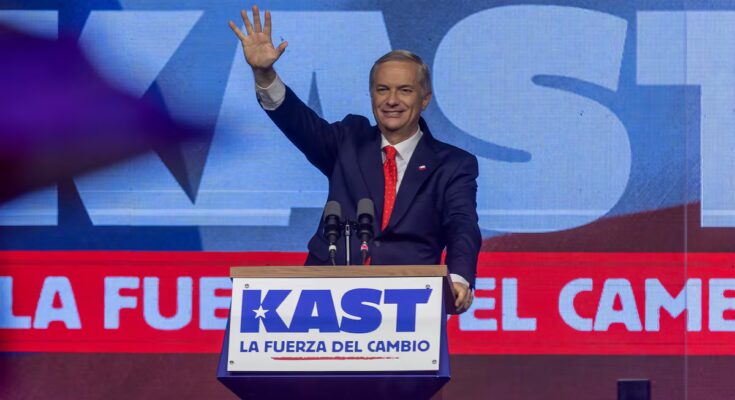The recent presidential and parliamentary elections achieved a high level of citizen participation – with more than twelve million voters – being the first, since the return of democracy, based on compulsory voting. A context of party fragmentation, divisions on the right and the absence of centrist options for the first time – since 1989 – marked the campaign and the entire phase preceding the elections. Contrary to the projections of most polls, Jeannette Jara won slightly, with less than 27% of the vote, against the candidacy of José Antonio Kast, who obtained about 24%. The surprise of the day was the vote for Franco Parisi, who, as in 2021, again placed in third place – this time with more than 19% – increasing his consensus both in volume and percentage.
The vote obtained by the official candidate tends to coincide with the support expressed by citizens for the management of the current government. Less than 30% supported Jara, a percentage similar to the government’s consensus, according to what polls consistently record. With the level of votes obtained by Jara, as well as by other candidates belonging respectively to the center-left and the left, such as Marco Enríquez-Ominami and Eduardo Artés, who together do not reach 2%, the chances of being elected in the second round become almost impossible. Indeed, Jara’s best performance occurred in the Santiago metropolitan region, in whose municipalities the right as a whole garnered more than 50% of the votes.
For the right, however, the panorama offers greater possibilities both for what the three candidates have put together and for the progress recorded in both houses of Congress. In fact, apart from the support of Johannes Kaiser and Matthei, the right obtained, for the first time since the return to democracy, a majority in the Chamber of Deputies and a sort of equality in representation in the Senate. However, it does not reach the 4/7 necessary to reform the Constitution or modify the organic constitutional laws, which would force a possible right-wing government to have to negotiate with the opposition on these issues.
In this panorama it is worth asking: how to interpret this new advance of the right? At the same time, what are its immediate projections and its implications from a political point of view?
First of all, the errors and lack of self-criticism of both the current government and the parties in power must be mentioned, to correct a course lost after the failure of the first constituent process, in 2022. During the electoral campaign it was the right – and in particular Kast – who managed to impose its own agenda, in terms of security, growth and reduction of unemployment, all priority issues for citizens – as recorded in most polls. The rest of the candidates simply incorporated these themes into their electoral axes, without presenting alternative proposals.
Secondly, it should be added that the recent elections were preceded by accusations of corruption, actions of organized crime, rising unemployment and a perception of skepticism, if not pessimism, regarding the future. By the way, such situations not only make it possible to understand the result achieved by the ruling party, but also become challenges for the next government.
Third, the fact that the current government has never taken citizens’ security issues seriously. At first he avoided the debate, or took it up due to ideological prejudice, especially among representatives of the alliance of the Communist Party (PC) with the Frente Amplio (FA). On several occasions, security problems have caused controversy between these parties and those of the so-called “democratic socialism”.
Fourth, the organizational weakening of the parties. A fact that has led to a fragmentation and denationalization of political representation, referring to specific territories. Fragmentation has tended to strengthen the poles, right and left, to the point of causing the spread of the political center. It is therefore no coincidence that the parties most affected are those that were part of the former Concertación, which currently have reduced electoral support and a weak presence in both chambers of the National Congress.
Before the elections, the electoral context was characterized by frequent mobility in voters’ preferences, as revealed by public opinion surveys. This was demonstrated by the results themselves, taking into account the position that the Chilean Vamos candidate, Evelyn Matthei, had at the beginning. Furthermore, the lack of distinction between offers and the proposals of the different candidates did not allow us to clearly recognize the level of distance between one option or the other.
Jara had a performance that left her in first place, with no contenders to challenge her and claim representation of the center-left and the rest of the left. For the first time a communist candidate managed to attract the support of the Christian Democrats in her own party. No matter how much she tried to distance herself from the government, she ultimately had to shoulder the costs of remaining a candidate. Even worse considering that there were clear signs of intervention by the government. Suffice it to mention the maneuver to extend the constitutional charge against the former Energy Minister until after the elections, or to postpone the release of the results of the National Socioeconomic Characterization Survey (CASEN), which show progress or regression in poverty reduction.
The electoral competition has highlighted a strong dispute for leadership and hegemony within the right. With Kast’s passage to the second round and the progress achieved by the Republican Party in both houses of Congress, it is clear that the recent elections mean a defeat for Chile Vamos, formed by National Renewal (RN), Independent Democratic Union (UDI) and Political Evolution (Evopoli). The results have allowed the shift towards a “more radical” right, although it is important to highlight that the latter sector derives from parties such as RN and UDI. After all, the three right-wing candidates depend on Pinochet’s past or, in the case of Matthei and Kast, on figures who supported the former dictator in the 1988 plebiscite.
Government spokeswoman Camila Vallejos defined the recent elections as crucial for “the consolidation of democracy”. According to his logic, Chilean democracy is consolidated with the triumph of an heir of Pinochetism and original unionism. A true paradox if we also consider that the ballot will take place on 14 December, the same date as the first elections – again presidential and parliamentary – which marked the return to democracy in 1989.



